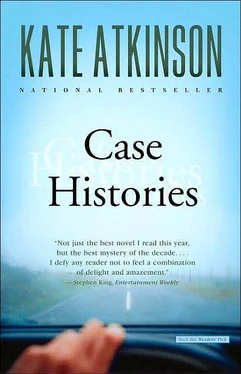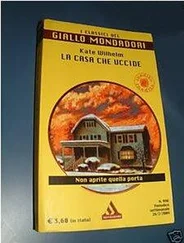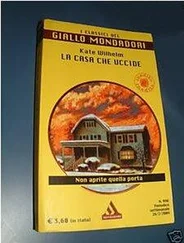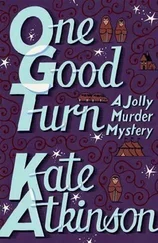There were pictures of little girls dressed like that all over the Internet.
Jackson pushed his way with no attempt at civility through a crowd of Spanish teenagers and grasped Marlee's arm and shouted. "Where've you been?" at her. He felt like punching Theo, although he didn't know why, as it was obvious that Marlee was fine, stuffing her face with chips. She would probably follow a stranger for a single Malteser.
"I'm babysitting," Theo said to Jackson, "not cradle snatching." and Jackson felt ashamed. "Right," he said. "Of course, I'm sorry I was worried."
"Theo's looking after me," Marlee said, "and he bought me fries. I like him." Jesus, was it as simple as that?
"Did your mother just dump you here?" Jackson asked when they got back to the office.
"David brought me."
"So David dumped you?" What a tosser.
"Deborah was here."
"Well she's not here now. [Where the hell was she?] You left the office open, so anyone could have walked in, and you went off with a complete stranger. Do you have any idea how dangerous that could be?"
"Don't you know Theo?"
"That's not the point. You don't."
Marlee's lip began to wobble and she whispered, "It's not my fault, Daddy," and his heart lurched with guilt and contrition. "Sorry, sweetheart," he said. "You're right, it's my fault." He put his arms round her and kissed the top of her head. She smelled of lemony shampoo and burger grease. "My bad," he murmured into her hair.
"Is it alright to come in?" A woman stood uncertainly in the doorway. Jackson loosened his grip on Marlee, who'd been letting him squeeze the air out of her in a long-suffering kind of way.
"I only came to make an appointment," the woman said. Late thirties, jeans, T-shirt, thonged sandals. She looked fit (Jackson imagined kickboxing) but she had dark shadows under her eyes. A Sarah Connor type. Or that nurse from ER that all men knew they would treat so much better than her on-screen boyfriends did. (Jackson had started to watch a lot of television since the break up of his marriage.) There was something familiar about her. Most people who looked familiar to Jackson usually turned out to be criminals, but she didn't look like a criminal.
"Well," he said, gesturing vaguely round the office, "we can talk now if you like?"
The woman glanced over at Marlee and said, "No, I think I'll make an appointment," and Jackson knew right then that it was something he didn't want to know about.
She made an appointment for eleven o'clock on Wednesday, "because I won't be on nights then," and Jackson thought, "Nurse," which was why she looked familiar because nurses and policemen saw far too much of each other professionally. He liked nurses, and not because of any Carry On films or mucky postcards or porny outfits or any of the usual reasons, and not the big, practical nurses with huge backsides and no imagination (and there were a lot of them), no, he liked ones that understood suffering, the ones that suffered themselves, the ones with dark shadows under their eyes that looked like Sarah Connor. The ones that understood pain, in the way Trisha and Emmylou and Lucinda did when they sang. And maybe when they weren't singing as well, who knew?
She definitely had a certain something. A je ne sais quoi. Her name was Shirley, she said, and he knew, without having to ask her, what she was here for. She'd lost someone. He could see it in her eyes.
Are we going home now?" Marlee asked with an extravagant sigh as she clambered into the back of the car. "I'm starving."
"No, you're not."
"Yes, I am. I'm growing," she added defensively.
"I would never have noticed."
"The car smells of cigarettes. It smells disgusting, Daddy. You shouldn't smoke."
"I'm not smoking now. Sit on the other side, not behind me."
"Why?"
"Why not?" (Because if for some reason the seat belt fails you'll go straight through the windscreen, which will be marginally safer than going straight into the back of me.) Marlee moved over into the left passenger seat. The Diana seat. She locked the door. "Don't lock the door, Marlee."
"Why not?"
"Just not." (So that if the car catches fire it'll be easier to get you out.)
"What did that lady want?"
"Miss Morrison?" Shirley. It was a nice name. "Are you buckled in?"
"Yeah."
" 'Yes,' not 'yeah.' I don't know what Miss Morrison wanted." He did know. He could see it in her eyes. She'd lost something, someone, another entry to make on the debit side of the lost-and-found register.
The most interesting case he'd had in months had been Nicola Spencer (which just about said it all really). Otherwise it had been dull, routine stuff, and yet now, suddenly, in the space of a couple of weeks, he had acquired a cold murder case, a thirty-four-year-old unsolved abduction, and whatever fresh misery Shirley Morrison was about to lay at his feet.
He glanced at Marlee. She was writhing around in the backseat like a miniature Houdini. She ducked down out of view. "What are you doing? Is your seat belt still on?"
"Yes, I'm trying to reach this thing on the floor." Her voice was muffled with the effort.
"What thing?"
"This!" she said triumphantly, reappearing like a diver coming up for air. "It's a tin, I think." Jackson looked in the rearview mirror at the object she was holding aloft for his inspection. Oh, Christ, Victor's ashes.
"Put it back, sweetheart."
"What is it?" She was trying to open the ugly metal urn now and Jackson reached round and grabbed it off her. The car swerved and Marlee gave a scream of horror. He settled the urn in the foot well of the front passenger seat. Julia had asked him to collect it from the crematorium this morning "because you have a car, Mr. Brodie, and we don't," which Jackson didn't think was a particularly valid reason, given that he'd never known Victor. "But you were the only person at his funeral," Julia said.
"You're not going to cry, are you?" he said to the mirror.
"No" – said very angrily. Marlee could be like a force of nature when she was angry. "You nearly crashed."
"No, I didn't." He raked around in the glove compartment for sweets but all he could find were cigarettes and loose change for parking meters. He offered her the money.
"What's in the tin?" she persisted, taking the money. "Is it something bad?"
"No, it's not anything bad." Why wouldn't he tell her what was in the tin? She understood about life and death, she'd buried enough hamsters in her eight years on earth, and last year Josie had taken her to her grandmother's funeral. "Well, sweetheart," he began hesitantly, "you know when people die?"
"I'm bored."
"Let's play a game then." "What game?"
Good question. Jackson wasn't very good at games. "I know. If you were a dog, what dog would you be?"
"Don't know." So much for that. Marlee began to grumble in earnest. "I'm hungry, Daddy. Daddy."
"Yeah, okay. We'll get something to eat on the way."
"Say 'yes' not 'yeah.' Way to what?"
"A convent."
"What's that?"
"It's a bunch of women locked up together."
"Because they're bad?"
"Because they're good. I hope."
Well, it was one way to keep women safe. Just put them in a convent. "Get thee to a nunnery." The convent smelled like every Catholic church Jackson had ever been inside – an excess of incense and Mansion House polish. People always said to him, "Once a Catholic, always a Catholic," but it wasn't true. Jackson hadn't been inside a church for years – except for funerals (weddings and christenings never seemed to figure on his social calendar) – and he had no belief in any god. His mother, Fidelma, had done her best to raise them in the church but somehow it had never stuck with Jackson. Sometimes there were fragments of memories, his mother's long-forgotten voice. Anima Christi, sanctifica me.
Читать дальше

![Дорис Лессинг - Заметки к истории болезни [Notes for a Case History ru/en]](/books/232730/doris-lessing-zametki-k-istorii-bolezni-notes-for-thumb.webp)










